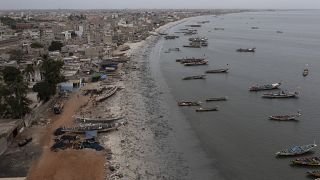Nigeria
This is Ayetoro, where waves break over concrete bricks, wooden posts and ruined homes.
The lives of its residents have been upturned repeatedly as the sea eats into their neighbourhood.
Ayetoro, otherwise known as the Happy City, was founded in 1947 as a utopian Christian community.
Victoria Mofeoluwa Arowolo, a retired civil servant, has lived here her whole life.
“Ayetoro was like a paradise, a city where everyone lived joyfully, happily, that you will really enjoy living here."
But she has been forced to move home three times.
The old community is submerged beneath the waves. “More than two-third of Ayetoro has been claimed by this sea erosion. Where we are is a new settlement, the old Ayetoro has been taken away by the sea and if you look where the sea is now, that is the end of the former Ayetoro."
“Most of our children now cannot go to school, because the building has been taken away by the sea”, she adds.
The remnants of sunken buildings bear the scars of the relentless advance of the sea, which chips away at the shores of the Ondo State community.
Thousands of people have left, many others choose to remain.
Stephen Tunlese lost his livelihood when his former clothing shop was claimed by the encroaching waves.
Tunlese says he lost an investment of eight million naira, or the equivalent of $5,500, to the sea.
“The erosion affected me badly because I lost my house, I lost my shop” which was worth eight million Naira (US$5.5 thousand in today's exchange rate) says Tunlese.
Now he adapts to a watery future. He repairs fiberglass boats.
The Mahin mud coast where the community is slipping away has lost more than 10 square kilometers, or nearly 60% of its land, to the ocean in the past three decades.
Researchers say a number of things are contributing to Ayetoro's disappearance.
Underwater oil drilling is one reason, according to marine geologist Olusegun Dada, a professor at the Federal University of Technology in Akure, who has studied years of satellite imagery. As resources are extracted, the ground can sink.
But he and colleagues note other reasons, including the deforestation of mangroves that help anchor the earth, and the erosion caused by ocean waves.
More research is needed to understand all the factors at play he says :
"I discovered the changes that are happening in the environment and there is a need to really understand the marine processes that are actually occurring, as you can see in this environment we have the ocean surge, and also we have erosion. And at the same time we have flooding from time to time.”
Today, the freshwater ecosystem is transforming into a salty marine one, spoiling sources of drinking water that residents rely on says Oluwambe Ojagbohunmi, the traditional ruler of Ayetoro community and head of the local church.
“To get water has been so difficult. Water, water everywhere, none to drink. Because the sea water has mixed with the river water. So the river water is now the same salinity with the sea. We no longer have river aquatic organisms, there is sea fishes and all that, that we find in the river. So we depend on rainwater for drinking. Which is really not good.”
For the residents losing their community to the ocean it is a painful process.
“We have lost a certain glory in this community, a certain beauty in this community,” says Arowolo.
Although many have left, others have a deep bond to the community they call home.
"This is my father's land, I can't leave my father's' land," says Tunlese.
For years, low-lying nations have warned the world about the existential threat of rising seas.
Nigeria, Africa's most populous country, struggles to respond.
Early this year, the Ondo state government announced a commitment to finding “lasting solutions” to the threat to Ayetoro. But residents say that's been promised in the past.
It might be too late for efforts to be effective, Dada says. For years, he has hoped for an environmental survey to be carried out to better understand what's causing the community's disappearance. But that's been in vain.
"The first thing that the government would (should) have done is to carry out research about the processes, the marine processes that is responsible for the coastal erosion that we are having at Ayetoro," says Dada.
The Niger Delta Development Commission, a government body meant in part to address environmental and other issues caused by oil exploration, didn't respond to questions from The Associated Press about efforts to protect the community's shoreline.
Dramatic images of coastal communities slipping away only capture Nigeria's attention from time to time, as when the annual flooding occurs — another effect of climate change.
“And we are talking about climate change, global warming, the sea level is rising, but we don’t really know what is happening.” says Dada.











01:22
World will have to learn to live with heatwaves, UN says
00:24
Greenland and Iceland saw record heat in May
01:20
UN ocean conference opens in Nice with focus on conservation, climate action
01:30
Macron sparks global push to protect oceans
01:06
Experts warn of an increase in Glacier-related risks from climate change
01:39
Hundreds dead and missing after Nigerian town submerged by floods